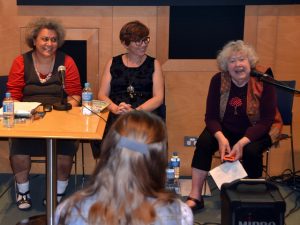I was lucky enough to be part of two panel sessions in the past month. First, I was on a panel discussing writing children’s poetry at the Queensland Poetry Festival and, more recently, I was part of a panel discussing empathy in fiction as part of Research Week at Edith Cowan University.
I love speaking about books and writing and while I absolutely love talking about my own books, the opportunity to be on a panel offers a different opportunity, which I love. While both panels allowed me to apply my own work and experience to the topics at hand, they also offered the opportunity to learn and consider how other people work, and particularly how other writers, sometimes working in different genres or for different audiences, approach similar challenges.
In Queensland, I the panel consisted of myself, June Perkins (who also convened the panel), and JR Poulter – all of us children’s poets who write in other genres as well – and chair Dr Virginia Lowe, a children’s literature expert. We discussed topics including how children’s poetry differs from that written for adults, why poetry is important, and our own writing processes. This was followed by a reading session, where we each shared from our own work, as well as questions from the audience (including both adults and children).
In Bunbury, the panel consisted of myself, Dr Vahri McKenzie (a creative arts academic and writer, and also the supervisor of my recent PhD studies) and Lesley Thiele (a fabulous up and coming writer, whose short fiction has had much success) , and chair Narelle De Boer, a PhD candidate and lecturer in the creative arts. We each read from recent works, and discussed the topic of empathy and how we develop it in our writing, as well as answering lots of thought provoking questions on a range of topics from the audience. For me, this was a different opportunity because I was the only panelist who specialises in writing for children, so it was interesting to be able to see (and demonstrate to the audience) similarities and differences in the way we work.
Although the two panels were quite different, they both ran well, I think because of the strength of the organisation behind them. Although I can’t take credit for that, my observations of how to make a panel work might come in handy if you are appearing on one yourself – or planning one for a literary event:
- A strong, passionate, moderator is essential. Both Virginia and Narelle knew their stuff, had lots to contribute, and kept the conversation going.
- Diversity of panellists makes for interest. Unusually, both panels I was on were all female, but we came from a range of backgrounds, and had different publishing, professional and personal experiences. If panellists match too closely there may not be enough to discuss – too much “me too-ing”. This wasn’t a problem on either panel I was on.
- Promote the event to ensure you have an audience. Neither panel had a huge audience, being niche events, but the people who were there were there because they were keen to hear what we had to say. Some had come through word of mouth, others through social media links. Neither session had a big advertising budget, but enthusiastic sharing drew people in.
- Don’t over prepare. Let the conversation flow depending on interactions of the panellists and according to audience input. Both panels seemed to flow organically, although there was good ground work laid before the event to ensure we knew what we would/could discuss.
- Lastly, try to relax and enjoy it. Sometimes things go wrong – sound systems don’t work, IT seems like it won’t function, you forget to make a point – but generally, the audience doesn’t notice. And if they do, they are very forgiving. Remember, they are there because they are interested in what you have to say: not because they want to judge you.
If you have any tips for successful panels, leave a comment. I’d love to hear what works for you!